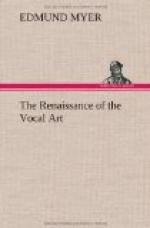Since writing my last book, “Position and Action in Singing,” and after four or five years more of experience, I have been doubly impressed and more than convinced of the power and influence of certain things necessary to a right training and use of the voice. Herbert Spencer says, “Experience is the sole origin of knowledge;” and my experience has convinced me, not only that certain things are necessary in the training of the voice, but that certain of the most important principles or conditions demanded by Nature, are entirely wanting in most systems of singing.
Singers, as a rule, are artificial and unnatural. They do not use all the powers with which Nature has endowed them. This has been most forcibly impressed upon my mind by the general lack of vitality, or vital energy, among singers; by a general lack of physical vitality, and, I venture to say, largely of mental vitality, and undoubtedly of emotional vitality, often, but mistakenly, called temperament. These things have been forced upon me by the general condition of depression which prevails. Vitality, however, or vitalized energy, is in fact the true means or device whereby the singer is enabled to arouse his temperament, be it great or otherwise; to arouse it, to use it, and to make it felt easily and naturally.
Out of every hundred voices tried I am safe in saying that at least ninety are physically depressed, are physically below the standard of artistic singing. Singing, it is true, is more mental than physical, and more emotional than mental; but a right physical condition is absolutely necessary, and the development of it depends upon the way the pupil is taught to think. Singing is a form of self-expression, of an expression of the emotions. This is impossible when there is physical depression. The singer must put himself and keep himself upon a level with the tone and upon a level with his song, the atmosphere of his song; upon a level with the sentiment to be expressed, physically, mentally and emotionally. This cannot be done, or these conditions cannot prevail, when there is depression.
There is, to my mind, but one way to account for this condition of depression among singers. That is, the way they think, or are taught to think, in regard to the use of their bodies in singing. The way in which they breathe and control the breath, the way in which they drive and control the tone. It is the result of rigid muscular effort or relaxation, and both depress not only the voice but the singer as well. The tonal result is indisputable evidence of this.
Knowledge comes through experience; and my experience in studying both sides of this question has convinced me that there is but one way to develop physical, mental and emotional vitality in the singer, and that is through some system of flexible, vitalized bodily movements. There must be flexible firmness, firmness without rigidity. The movements as given in my book, “Position and Action in Singing,”




